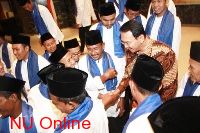Jakarta, NU Online
Madari, 65, will never forget the day when the Jakarta Mosque Council summoned him and said he was among the first 30 mosque keepers selected to perform umrah (a minor pilgrimage), courtesy of the city administration.<>
“I was excited. I was speechless. I started preparing right away,” he told The Jakarta Post at City Hall on Tuesday.
The father of four said he thought he would never go on a pilgrimage. Madari has been a mosque keeper at At-Taufiq Mosque in Pondok Pinang in South Jakarta for more than 15 years and earns Rp 300,000 (US$23) a month. He also worked as a security guard in a South Jakarta school, receiving Rp 700,000 monthly.
“With the money I make, I can’t afford to pay for a pilgrimage. I can’t save a penny,” he said.
Asni, another mosque keeper, shared the same enthusiasm.
The 64-year-old, who has been mosque keeper of An-Nur Mosque in Menteng in Central Jakarta for 10 years, said he hoped thousands of other mosque keepers in Jakarta would get the same opportunity.
“I’m very happy to have received this honor,” he said.
There are 3,145 mosque keepers working in around 3,000 mosques in the capital.
Jakarta Governor Basuki “Ahok” Tjahaja Purnama symbolically sent the 30 Jakarta mosque keepers on umrah on Tuesday. They will head to Mecca on Thursday night.
The development marks the first time the city administration has set aside its budget to pay for such trips.
The 30 mosque keepers had fulfilled the requirements set by the administration. They must be over 40 years old, have worked as a mosque keeper for more than 10 years, be able to read the Holy Koran, have never before performed umrah and haj pilgrimages, and have memorized basic Koran passages and verses.
Previously, Ahok had vowed to send mosque keepers on umrah every year.
“I’ve noticed that mosque keepers have a very important job but are paid very little. I knew that mosque keepers wouldn’t be able to afford umrah or haj, so I thought that paying for the mosque keepers’ trips on umrah would be a good idea,” Ahok said at City Hall in front of the mosque keepers and their families.
Ahok wished the mosque keepers luck and asked them to stay safe in Mecca. The governor, a Christian of Chinese descent, also reminded the mosque keepers to fully understand the Holy Koran, so they would not be easily influenced by extremists.
He also reminded them to uphold Islam’s rahmatan lil alamin principle, which literally means “grace to all people”, meaning that it did not discriminate against others, including those of different religions.
Ahok said he still remembered that while he was a regent in Bangka Belitung, a mosque keeper had refused him entry to the mosque during a Ramadhan visit and had asked him to stay outside.
The mosque keeper refused Ahok and said Ahok was a kafir (infidel). He said he was forced to watch from outside and sat under a tree.
“Islam is a beautiful religion but people have different interpretations of its principles. Islam does not teach discrimination,” he said.
Indonesia Islamic Council president Arman Zakaria said as quoted by beritajakarta.com that Ahok’s move was a good example of tolerance and honor for the country’s motto of Bhinneka Tunggal Ika (Unity in Diversity).
Ahok, who attended Islamic schools from the elementary to senior high school level, is known for his stance against intolerance and the use of violence in the name of religion.
He has been at odds with the Islam Defenders Front (FPI), an organization that was against his inauguration as Jakarta governor. The FPI has inaugurated its own choice of Jakarta governor.
Some mosques are known to be influenced by hard-liners. One was Al-Munawwarah in Pamulang, South Tangerang, Banten, which was once linked to terrorism as it was led by Abu Jibril, the father of terror suspect Muhammad Jibril who was detained by the police in 2009.
The mosque’s management quickly denied the accusation, saying that Abu Jibril had become its leader after there was an absence of leadership in the mosque.
Editing by Sudarto Murtaufiq
Terpopuler
1
Khutbah Jumat HUT Ke-80 RI: 3 Pilar Islami dalam Mewujudkan Indonesia Maju
2
Ketua PBNU Sebut Demo di Pati sebagai Pembangkangan Sipil, Rakyat Sudah Mengerti Politik
3
Khutbah Jumat: Refleksi Kemerdekaan, Perbaikan Spiritual dan Sosial Menuju Indonesia Emas 2045
4
Khutbah Jumat: Kemerdekaan Sejati Lahir dari Keadilan Para Pemimpin
5
Khutbah Jumat Bahasa Jawa: Wujud Syukur atas Kemerdekaan Indonesia ke-80, Meneladani Perjuangan Para Pahlawan
6
Sri Mulyani Sebut Bayar Pajak Sama Mulianya dengan Zakat dan Wakaf
Terkini
Lihat Semua















